July 20, 2018
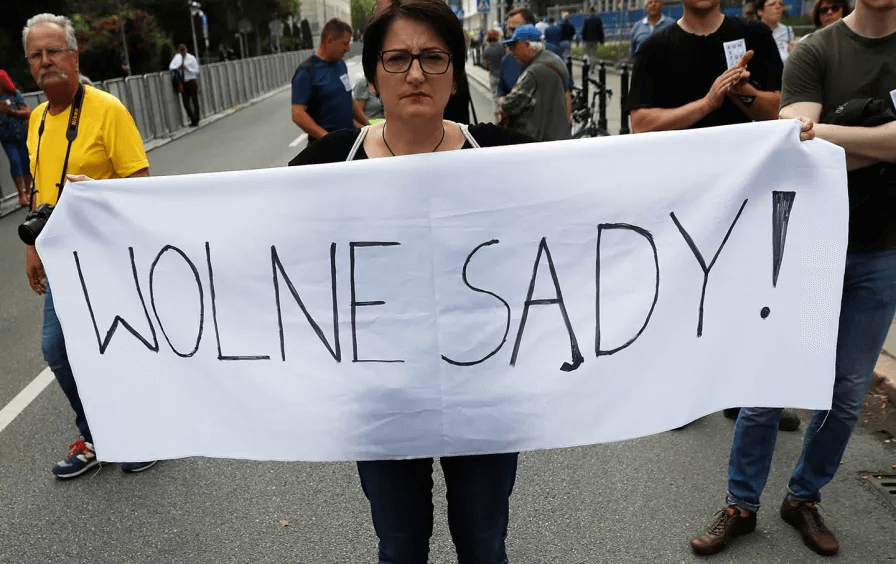
A woman holds a banner reading “Free Courts” at a protest outside the Parliament building in Warsaw, Poland on July 18, 2018. Reuters, Kacper Pempel.

Last week, rebel forces in the Deraa province agreed to surrender the region to the government in return for their safe evacuation to northern Syria. Just a few days after this evacuation agreement, Assad’s forces moved into the nearby Quneitra province and continued attacking rebels. On the 19th, rebel forces surrendered and agreed to leave Quneitra.
On the other hand, negotiations between the government and rebel forces in Nawa (the largest urban center in Deraa province) faltered when opposition leaders refused to capitulate their control in the region. The government proceeded to conduct an intense overnight bombing campaign between Tuesday and Wednesday, which included at least 350 launched missiles. Nawa’s only hospital was bombed, many (including doctors) were killed, and at least 150 were wounded.
The government’s attacks in Deraa and Quneitra sparked a peaceful protest on Tuesday near the frontier of the Israeli-occupied Golan Heights. Protestors waved white flags at Israeli soldiers, requesting protection from the government’s offenses. However, the protestors were quickly dispersed by Israeli soldiers who claimed they used loudspeakers to request the Syrians to turn back.
On Thursday, Hay’at Tahrir al-Sham (an al-Qaida linked rebel group) exchanged the release of 1,5000 prisoners held by the government and Hezbollah for the safe passage of Fua and Kefraya residents to Aleppo. Hay’at Tahrir al-Sham had imposed a siege on the two towns Fua and Kefraya for three years, making the civilians suffer from food and medicine shortages. The two towns are in the heart of Idlib, a region in northern Syria, which is the last rebel holdout against Assad’s impending forces.
Vladimir Putin and Donald Trump discussed Syria during the Helsinki Summit on July 16th. Both leaders agreed to work to end the conflict. President Trump has consistently expressed his desire to pull US troops out of Syria, despite the US military’s historical support of the rebel forces in the past. Therefore, the cooperation between the US and Russia (Syrian President Bashar Assad’s top ally) will likely amount to a reversal of American policy in Syria. Russian President Putin suggested that the two countries can work together “to overcome humanitarian crises and help Syrian refugees to go back to their homes.” Ironically, Russia has been heavily involved in the recent attacks on hospitals and humanitarian aid convoys in southwestern Syria. Russian officials, however, have denied involvement and claimed that the accused Russian forces are pro-Syrian fighters. Meanwhile, Israel continued its attacks against Iranian forces by striking a military base in Aleppo. The state-run Syrian News Agency condemned this attack, which killed nine regime fighters.

After the horrific rape and mutilation of a nine-year-old girl with down syndrome, activists have lined the streets of Bolivia in protest. Groups against assault were joined by members of the Down Syndrome Association of Sucre to demand maximum sentencing for the perpetrator, who is currently being held in the San Roque jail for aggravated rape.
Statistics from the Prosecutor’s Office report 726 sexual abuse cases and 37 cases of infanticide in Bolivia between January and June of last year, though actual numbers are likely higher due to unreported cases.

Last Friday, activists organized a nation-wide strike that closed all businesses in an effort to place pressure on Ortega to resign. Unfortunately, Nicaraguan police and pro-government paramilitary forces successfully retook the Monimbo neighborhood in Masaya just days after the strike, leaving three dead and dozens wounded on Tuesday.
This week, a rural activist and Campesino leader, Medardo Mairena, was unfairly arrested for organized crime, terrorism, and the deaths of four police officers. Mairena’s arrest sparked activists to rally outside of Managua Central Judicial Complex and demand his release. At a conference set up by SOS Nicaragua Global, a group of Nicaraguans living abroad who support the protesters, student activists spoke of the gross human rights abuses committed by Ortega’s government. The students cited that 350 people have been killed, 169 have disappeared and 3,000 have been wounded by police agents since the beginning of the protests. Furthermore, the kidnapping and torture of two Nicaraguan-Americans by paramilitary groups has received media coverage, though the two were able to escape safely and are now in the United States.

North Korea has imported more than three times the amount of petroleum allowed under UN sanctions, and the US submitted a report and request for sanction enforcement to the UN Security Council in response. However, China and Russia placed a “hold” on the complaint, thus inhibiting the UN from taking any action on the subject for the next six months.
North Korea has demanded that South Korea return 12 female employees who allegedly defected from a North Korean restaurant chain in China. North Korea alleges that the women did not resettle in South Korea by choice and were coerced into leaving, Should the women not be returned, North Korea’s government has stated that they may renege on their promise to unite families separated during the Korean War.
US Director of National Intelligence Dan Coats has stated that North Korea’s denuclearization is highly unlikely and will almost certainly not take place within this year. Meanwhile, North Korea continues to delay its promised return of Korean War remains. Both developments stand in stark contrast to the promises made by the DPK during their summit with US President Trump in June. North Korea’s regional influence is growing, as they opened an official tourism office in Taipei this week.
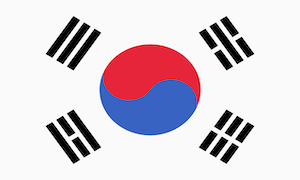
South Korea’s former President Park Geun-hye was sentenced to eight years of prison in addition to her previous sentence of 24 years. The new charges are based on abusing state funds and violating election laws, and as trials for her alleged crimes continue, critics suspect her sentence will only to increase.
Current South Korean President Moon Jae-in’s approval ratings fell six points to 61.7%, the largest dip in support so far in his presidency, after implementing a minimum wage increase sharply criticized by business owners.

Fortify Rights, a human rights group based in Bangkok, reported that the genocide of Rohingya civilians was orchestrated and planned months before the outbreak of violence in 2017. In preparation for its brutal crackdown, the military confiscated sharp objects, tore down protective structures around homes, withheld aid, and increased state security forces in the region. The report listed the names of 22 police and military officials deemed responsible for the violence in August 2017, when the attacks broke out. The list includes Commander in Chief Min Aung Hlaing, Deputy Commander in Chief Soe Win, and Joint Chief of Staff of the Army, Navy, and Air Force Mya Tun Oo.
This ethnic hatred and violence have brought international attention to the role of Facebook in disseminating messages that led to genocide. Derek Mitchell, who served as United States Ambassador to Myanmar from 2012 to 2016, claimed that Facebook was unresponsive when he reached out to them in 2013 in an attempt to curb the spread of anti-Rohingya messages online. Only after some the death and displacement of over 700,000 people did Facebook CEO Mark Zuckerberg acknowledge the social media site’s role in fueling the conflict.
A landslide at a jade mine in northern Myanmar has killed at least 15 people, many of them ethnic Kachin youth from a refugee camp in Kachin state. The mining industry is extremely unregulated, and most profits of the industry go to Myanmar’s military elites.
Two Reuters journalists continue to fight for press freedom. In his recent testimony, Wa Lone claimed that he and his colleague Kyaw Soe Oo were framed by the police into violating the Official Secrets Act. He recalled an incident in which they were handed documents by policemen and told to take photographs of them.
A recent Human Rights Watch report titled “Nothing for Our Land; Impacts of Land Confiscation on Farmers in Myanmar” documents the decades-long government-perpetrated illegal confiscation of land in Myanmar. Activists are now calling on Aung San Suu Kyi’s government to investigate the confiscations, hold perpetrators accountable, and provide redress for those who’ve had their lands and livelihoods stolen. So far, Suu Kyi’s initiatives have been ineffective in addressing the concerns of the thousands who are still waiting for their land to be returned

After his highly televised meeting with Russian President Vladimir Putin this week, President Trump has encountered bipartisan fury for his remarks associated with Russian meddling in US elections. Russian Ambassador to the United States Anatoly Antonov has claimed that the summit was successful and important verbal agreements were reached regarding bilateral arms control treaties and concerns about the future of Syria, Iran, and North Korea. No details regarding these alleged agreements have been made public.
The Justice Department has indicted 12 Russian nationals on charges of hacking the DNC’s computers, stealing data, and publishing stolen files to disrupt the 2016 election. Another Russian, Maria Butina, has been accused of acting as an unauthorized foreign agent after establishing connections with powerful Republicans and special interest groups to form a backchannel with Russian intelligence operatives in attempts to sway the 2016 election.
Meanwhile, Iranian President Hassan Rouhani has taken the United States to the International Court of Justice over President Trump’s withdrawal from the 2015 nuclear agreement. While the US has reported these charges as “baseless,” Iran maintains that this approach shows their respect for the rule of law.

As Cambodia’s elections approach, Chinese and Japanese influence and soft power in the country have become more apparent. China has provided election observers, polling booths, laptops, and other election materials in an effort to expand its regional power. Japan has also provided thousands of ballot boxes and materials. However, both countries have received criticism for supporting the practically fraudulent elections, as increased electoral resources are no substitute for lack of political opposition and severe repression of civil activity.
This week, an American security-research company found evidence of Chinese hacking in the electoral computers and systems of the Cambodian National Electoral Committee. The attacks also targeted key dissidents and activists in a move of support for Prime Minister Hun Sen’s government.
Reports of threats by Cambodian security forces have surfaced in various provinces as armed government officers ask people to vote for the ruling Cambodian People’s Power or face repercussions. These threats continue the Party’s consolidation of power by weakening the opposition and intimidating voters. Any pretense for a democratic or free and fair election has long vanished since the banning of the main opposition party, the Cambodian National Rescue Party, last year.

Amnesty International condemned Mexico for blocking their investigation into the 2014 disappearance of 43 university students. According to Amnesty, Mexico’s government has implemented more than 100 legal motions to block any investigation into the subject. Not a single person has been convicted in relation to the original incident, but government forces have been implicated in handing over the students to a local drug cartel.
Not all of Mexico’s disappearances have been met with impunity, however, as the death of 13 people and the disappearance of 5 in Southern Mexico on Tuesday is being investigated this week.

A Singaporean shipping company has been charged and plead guilty to illegally dumping oil-contaminated bulge water at sea. The company will be fined $1 million USD and will receive a two-year probation.
On Monday, Singapore was featured on the State of the Internet/Security Summer 2018: Web Attack Report for having the largest source of web-application attacks in Asia. Such attacks compromise citizen’s safety, as Singapore has one of the highest internet connectivity speeds and residential wired broadband household penetration rates globally.
Thousands are expected to attend tomorrow’s state-sanctioned LGBTQ+ pride parade known as Pink Dot. Activists are enthused about the event’s ability to encourage locals to come out and be themselves, though there is much to be done in terms of broad civil rights and anti-discrimination laws in the country.
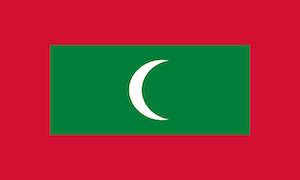
The European Union has approved sanctions against Maldivian government officials, including travel bans and asset freezes. Though the EU has yet to publicly name these individuals, they have called on the Yameen Government to engage with opposition leaders in “genuine dialogue that paves way for credible, transparent and inclusive presidential elections.” President Yameen has condemned these sanctions and has lambasted the opposition for welcoming foreign influence over the Maldives’ independence and sovereignty.
Chinese Ambassador Zhang Lizhong has denied claims of land grabs and debt traps and has reiterated that there are no political conditions attached to Chinese investments and projects in the region. Additionally, the Maldives is set to receive $40 million USD concessional loans from the OPEC fund for international development. Considering that these relief packages occur in tandem with ongoing international sanctions, there might not be any substantive improvement to democracy in the country.
The Maldives electoral body has been accused of removing ballot boxes in seven of the 14 islands, thus forcing Maldivian workers to travel to nearby islands to vote in September’s elections. The electoral body has also been accused of forcing elderly people and those with disabilities to seek help from polling officials, which would breach any confidentiality these citizens might have otherwise had in the voting process.
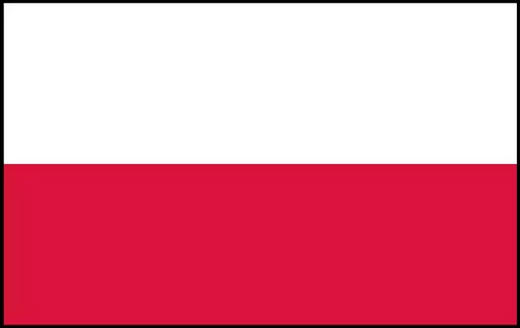
The government’s recent reversal of a Holocaust speech law has relieved some concerns about the influence of the Law and Justice Party (PiS) on Polish politics. However, the ongoing judicial crisis and PiS’ enduring influence over the stability of the ruling coalition shows that Poland’s democratic problems are far from over. The OSCE issued a statement declaring that Poland is risking the integrity and trust of its judicial institutions by politicising them. Supreme Court President Malgorzata Gersdorf continues to attempt to fulfill her duties despite the government’s claim that she has been removed in accordance with a retirement law. Thousands of protestors gathered in Warsaw to ask for free and independent courts.
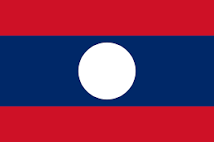
During the UN Human Rights Review in Geneva this week, the Laos delegation dodged questions on the whereabouts of several arrested villagers imprisoned for refusing to leave state-confiscated land. Questions about their whereabouts, health, and the precise justifications for their imprisonment were left unanswered.

The prospect of free elections in Zimbabwe has bolstered the rise of independent media in the country. Zimbabwe’s largest independent newspaper The Zimbabwe Independent has gained international attention for its usage of the word “coup” to describe the military’s removal of former President Robert Mugabe and their appointment of Emmerson Mnangagwa to the position. The rising presence of independent media is a sign of the country’s progress, especially given that the majority of the media market is state-owned.
Opposition leader Nelson Chamisa has cast doubts about the legitimacy of the upcoming election and has criticized the electoral commission for bias in favor of the ruling ZANU-PF party. Chamisa’s statements mark the significant deterioration in electoral rhetoric after a broadly peaceful campaign season.

A Vietnamese court has ordered the release and deportation of William Nguyen, the Vietnamese-American citizen who was detained for protesting the proposed law on special economic zones last month. While Mr. Nguyen could have faced up to seven years in prison, pressure from the US Congress and American Secretary of State Mike Pompeo have facilitated his release.
US lawmakers are troubled by Vietnam’s recent cyber-security law and have urged Google, Facebook, and other technology giants “to promote openness and connectivity” in environments which seek to control dissent. The new cybersecurity law requires foreign tech firms to store the personal data of Vietnamese users with the local government.
The Vietnamese government has expressed concern that the ongoing US-China trade war may reduce exports, impede foreign investment inflow, and hurt domestic production. The Central Bank is considering devaluating the Dong to reduce exports, but this might cause high inflation within the economy.

Blatant disregard for human rights abuse continued in the Democratic Republic of the Congo this week as President Kabila appointed General John Numbi and General Gabriel Amisi, two men under US sanctions for gross human rights misconduct, to the positions of Inspector General and Army Deputy Chief of Staff, respectively.
On Friday, Jean-Pierre Bemba confirmed his candidacy as an opposition candidate after his conviction as a war criminal was overturned this month. Bemba had been charged with crimes against humanity such as murder, rape, and pillaging while leading the Movement for the Liberation of Congo (MLC) party in an armed conflict in the Central African Republic. President Kabila, who yet to explicitly confirm or deny his candidacy in December’s elections, is set to give a national address on Thursday regarding the state of the nation and several “important decisions” he has made. Kabila has already completed an unconstitutional third term, and his commitment to holding free and fair elections this year is highly questionable. These events continued the alarming partnership between DRC’s government, army, and local militias which sow instability and destruction across the country. Enduring conflicts between regional and international rebel groups only make matters worse, as eight people were killed on Monday when the Ugandan Allied Democratic Forces (ADF), attacked an army base in the North Kivu province.
In brighter news, DRC’s recent Ebola outbreak is expected to end next week.

Former rebel leader Ivan Marquez has declined to join office after being elected to Colombia’s senate. Marquez is one of the ten FARC leaders elected to parliament under the Havana FARC deal and has denied the position on grounds that Colombia is extraditing a former colleague of his to the United States in breach of the FARC deal.
The United States has promised an additional $6 million dollars to help Colombia deal with the humanitarian crisis in Venezuela. Mark Green, the administrator for USAID has commented that this is a “man-made crisis” and the new funding will go towards nutrition and health programs along the Colombia-Venezuela border through the World Food Program and other partners. More than 50,000 Venezuelans have crossed the border into Colombia in less than a month.
The National Federation of Educators (Fecode) announced that they will hold a national strike on the 25th of July in response to violence from paramilitary groups which targets teachers and impedes access to education. The protests strive to force current President Juan Manuel Santos to fulfill his promise of alleviating the deficiencies in infrastructure, school transport and lack of investment in the education sector before he leaves office. Meanwhile, Colombia’s incoming Defense Minister Guillermo Botero is planning to “regulate” anti-government protests by mandating approval from authorities before any demonstration.

Venezuela has moved its central bank-controlled gold processing business to Turkey following increasingly strict international sanctions. Pressure on Maduro’s government from the global community has only increased in recent weeks, as countries such as Canada have urged their diplomats to defend human rights in the region and restrictions on trade tighten. Earlier this week, the United States revoked the visa of Asdrubal Chavez, the CEO of US-based Venezuelan refining unit Petróleos de Venezuela. Previously located in Houston, Texas, Chavez must now operate the petroleum plants from somewhere outside of the country and is now one of 48 Venezuelan nationals to be sanctioned by the US government for corruption and human rights abuses.
Several hundred senior citizens protested incomplete pension distribution this Wednesday. The demonstration took place a block away from the presidential palace amidst rapid inflation and increasing food and medicine prices across the country.
On Tuesday, protests against water and power outages in San Felix resulted in the death of a 12-year-old boy. Protestors alleged that police responded to their peaceful demonstration with gunfire, and four officers involved in the incident have been detained. Following the boy’s death, protesters marched to the local police station and partially burned the building.

On July 16th, opposition MPs of Malaysia’s Parliament Dewan Rakyat staged a walk-out to protest the appointment of Mohamad Ariff Yusof as Speaker of Parliament. They argued that Yusof’s nomination and appointment were against parliamentary procedure. After returning from the walkout, former Prime Minister Najib Razak accepted his position as an opposition lawmaker. The next day, Malaysia’s Sultan Muhammad V opened the first session of the new parliament.
On July 18th, during the first parliamentary debate, Najib called attention to the potential economic consequences of the new government’s cancellation of the Kuala Lumpur-Singapore high-speed rail project. Prime Minister Mahathir Mohamad had suspended various Chinese-led infrastructure projects on the grounds that they are too expensive and unbeneficial to Malaysia’s economy. Interestingly, some Chinese investments in Malaysia are suspected to be implicated in Najib Razak’s 1MDB scandal in which $4.5 billion in public funds are alleged to have gone missing. Furthermore, Najib Razak is known to be a staunch supporter of China’s Belt and Road Initiative, under which such infrastructure projects have been taking place. 1MDB investigations are currently being conducted by the United States, Switzerland, and Singapore.
Recently, the government’s plans to officially recognize exams taken in Chinese-medium high schools have been met with backlash and fear that Malay will no longer be the country’s official language. Malays feel that the new government is not able to protect Malay rights, Islam, the Malay language, and Malay rulers.
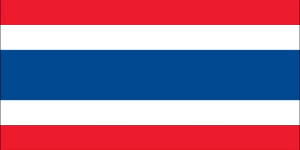
Amnesty International has called for the re-abolition of the death penalty in the country. The statement comes after the execution of a 26-year-old man on June 18th, the first execution since 2009.
Thailand is looking to legalize medical marijuana after allowing medical research on the drug. However, Thailand will continue its harsh sentencing rules for the possession and trafficking of marijuana and other drugs.
After a boat accident off the coast that killed 45 people, Chinese media has called for a boycott of tourism in Thailand. The boycott could cost Thailand more than $1 billion USD to the economy.
Cuba– The Cuban government has taken its first steps towards reforming major components of its constitution. Amendments include guarantees of private property, the creation of an office of the prime minister, a ten-year term-limit for the president, emphasis on foreign investment, and bans on various forms of discrimination. The reforms will retain Cuba’s socialist economy but show social progress amid economic tensions. – Newsweek
Russia– As Vladimir Putin watched Sunday’s final World Cup match from his presidential viewing box, four Pussy Riot protestors took to the field in police uniforms in a bold statement against Russia’s aggressive suppression of political freedoms and human rights. While FIFA broadcasting policies stipulate that game coverage should immediately pan away from individuals who run onto the field during a game, the incident was shown for several seconds in international media, perhaps in error or as a subtle nod to Russia’s ongoing human rights abuse. – New York Times
Israel- Israel has approved a bill declaring itself as a Jewish state, a decision Arab-Israelis, Palestinians, and the international community have condemned as the fall of Israeli democracy. Entitled “The Basic Law,” this new legislation dictates that “the right to exercise national self-determination is unique to the Jewish people,” and that Jerusalem is Israel’s “complete and united capital.” The law also declares Hebrew as the state’s official language despite Arabic’s high presence and importance within the region and emphasizes the importance of recognizing the “development of Jewish settlement as a national value” – likely a nod to increasing the legitimization of illegal Israeli settlements in the West Bank. This law constitutes a serious blow to the lives of Israelis and Palestinians living in the region, especially the 20% of Israel’s population which identifies as Israeli Arabs. Growing global concern that Israel’s treatment of Arabs, particularly Palestinians, is reminiscent of the Apartheid has also been voiced. – BBC
Iraq– Protests in Iraq continue as people across the country and the political spectrum expressed their discontent at inefficient government policies regarding employment, water, and security. The protests faced strong backlash from local and national security forces as protestors were doused with water cannons and shot at with rubber bullets. — Al-Jazeera
India– The Indian Supreme Court has decriminalized homosexuality and struck down Article 377 of the Indian Penal Code which criminalizes sex “against the order of nature.” The court stated that sexual orientation is a matter of privacy and hence a fundamental right under Article 21 of the Indian Constitution. – Scroll
France- Alexandre Benalla, a senior security advisor to President Macron, is under investigation for assaulting protestors during the May Day demonstrations in Paris. -CNN